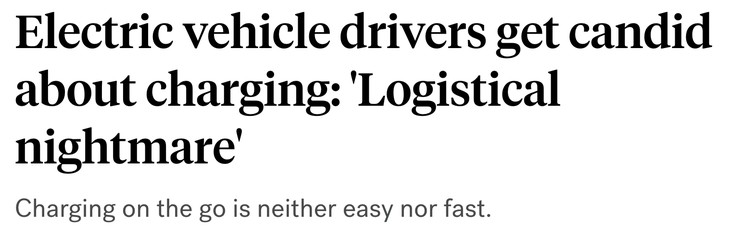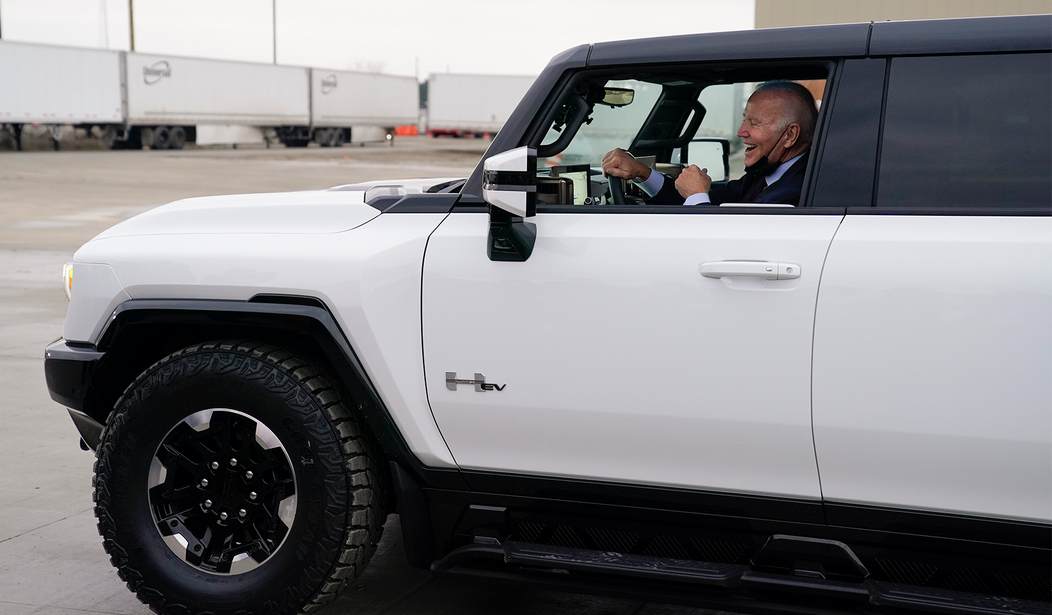ABC News has an amusing story about owning an electric vehicle.
Amusing, that is if you don’t actually own an electric vehicle. If you do, it is just depressing.
I’ve long thought of electric cars as commuting vehicles. Kinda cool. High prestige. Practical for local travel. And a nightmare if you actually want to travel anywhere.
In other words, a cool second car if you have the cash to spare.
But of course, that is not how they are being sold to consumers, particularly by the environmentalists who are in love with the idea of electric cars and utterly indifferent to the practicalities of life. They are perfectly happy to sacrifice your convenience for their principles, and will happily fly private to a climate change conference to promote their vision of the future.
ABC’s story was about the practicalities of vehicle ownership, or rather the lack of practicality for many people.
Charging, it turns out, is a nightmare. At least if you don’t own a Tesla, about which they had little to say. Tesla’s supercharger network, I gather, is better than what the rest of the market must rely on, although I would still have range anxiety if I owned one as my primary vehicle.
The headline is pretty blunt:

I have to say that this is quite the newsflash. Who would have guessed that EVs are not ready for prime time if you have to drive long distances?
Not me. You?
The logistical challenges of EV ownership wouldn’t be that big a deal except for one thing: several state governments, and now the federal government, are trying to force consumers into purchasing electric vehicles whether they want them or not. In a market where EVs are one choice there is no problem; if they are THE choice, it’s a big problem.
President Joe Biden prioritized emissions-free vehicles in the 2021 infrastructure law, vowing to increase the number of green vehicles on America’s highways and local roads. The president’s goals include installing 500,000 new chargers across the U.S. and dramatically boosting EV sales by 2030.
Biden’s push to install EV chargers sounds like a partial solution to the problem, until you realize that EV charging stations generally suck eggs. Having a charging station is one thing; finding a charger that works is yet another. Unfortunately it is a matter of luck to find a functioning charger that will actually fill up your battery in a reasonable amount of time.
Voelcker said he’s seen little improvement in
Tony Quiroga, editor-in-chief of Car and Driver, has been forced to wander the aisles of a Walmart in Burbank, California, while the EV he’s testing that day sits and charges. He’s become a familiar face at a Mexican restaurant in Mohave, California, where a Tesla charger is located. A coffee shop recently opened nearby that caters specifically to EV drivers.
“I imagine an ecosystem will be built around charging stations eventually,” he told ABC News. “Longer trips bring up flaws with EVs. People are leery of taking them on long trips — that’s why older EVs don’t have 40,000 miles on them.”
the nation’s charging infrastructure in the last four years and frequently hears complaints of dead chargers and sticky cables.
“The incentive right now is to get stations in the ground,” he said. “It’s not making sure they actually work.”
Sounds about right for a government program, especially one backed by Biden and implemented by Buttigieg.
Sandwich chain Subway announced Wednesday it was partnering with GenZ EV Solutions to build “Oasis Parks” at select dining locations. EV customers can expect charging canopies with multiple ports, picnic tables, Wi-Fi, restrooms, green space and playgrounds to make the charging experience more “seamless,” Subway said.
Nothing like spending an hour or three at a Subway while waiting for your soon-to-be-recalled EV to charge. Perhaps Subway will offer packages that will include lunch, dinner, and a charge for one flat fee.
Electric vehicles are not an inherently bad technology, although it seems that only Tesla has the experience to ensure that the ownership experience is relatively seamless. Most car companies don’t seem to have figured out the magic formula for ensuring that the vehicle serves the customers well outside the showroom.
But until the fueling experience becomes as relatively seamless as filling up the tank with gasoline, EVs make more sense as commuting cars than all-purpose transportation. I do 90% of my driving miles toodling around town doing chores. But a few times a year I travel 700 miles to visit my in-laws, and there is no way I would want to do that with an EV.
Even the people whose job it is to review these vehicles complain about range anxiety and the logistics of using EVs. And the customers who got suckered into the purchase? It can be a nightmare.
Sharon Bragg of Clifton Park, New York, has to charge her Ford Mustang Mach-E GT more frequently in the winter months. The GT’s EPA rating is 270 miles on a full charge. Bragg said it’s closer to 200 in the colder weather. Last December a Level 2 charging plug got stuck in her Mach-E and would not budge. After multiple failed attempts by bystanders, she called an electrician, who blew hot air on the plug for 20 minutes to release it.
“The whole process took two hours,” she told ABC News. “I was in the parking lot from 5 p.m. to 7 p.m. It was a cold day.”
Bragg said her parents, who also bought a Mach-E, have complained of broken public chargers and endless lines. Sometimes they drive for miles before they can find a public charger that’s working properly, she said.
My car is a 2005 V8 Lexus, and when I drive it on the highway it will easily go over 550 or more miles between fill ups. Around town I get around 400 miles between stops at the gas stations. And, of course, filling up is a 5 minute process.
The last thing I want or need is some politician explaining to me that I really want to spend a few hours at a subway chatting with other drivers stranded while their cars charge up. Imagine the president rolling up in his “Beast,” surrounded by Chevy Suburbans filled with Secret Service agents, in order to explain why we should enjoy the wait.
Of course that might be better than having Mayor Pete stop by wearing his hard hat to explain why we really should consider taking a train.








Join the conversation as a VIP Member